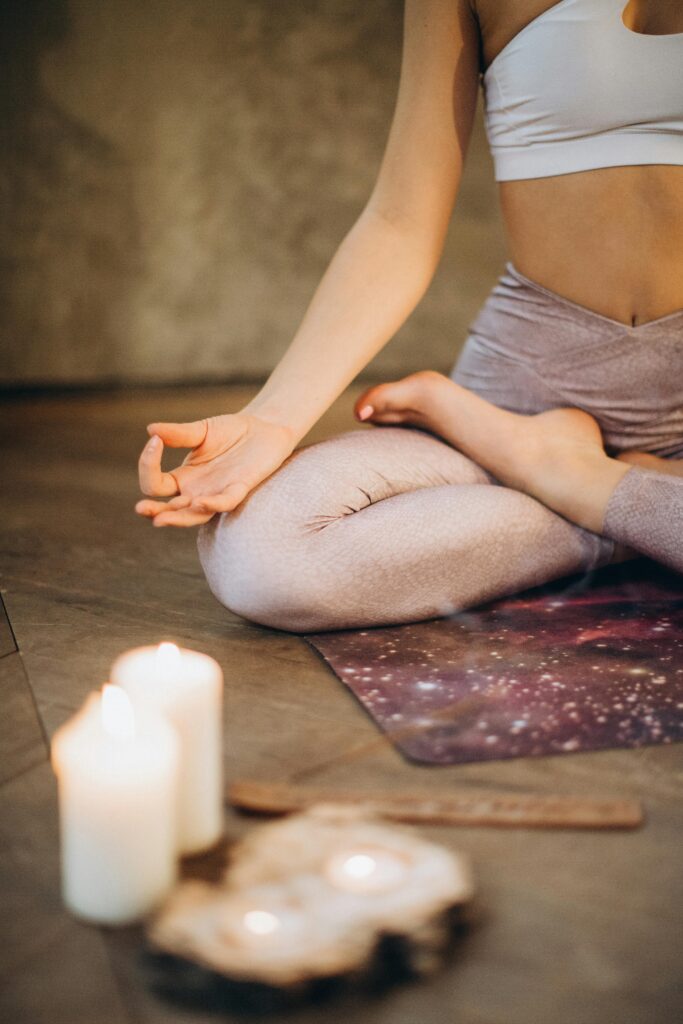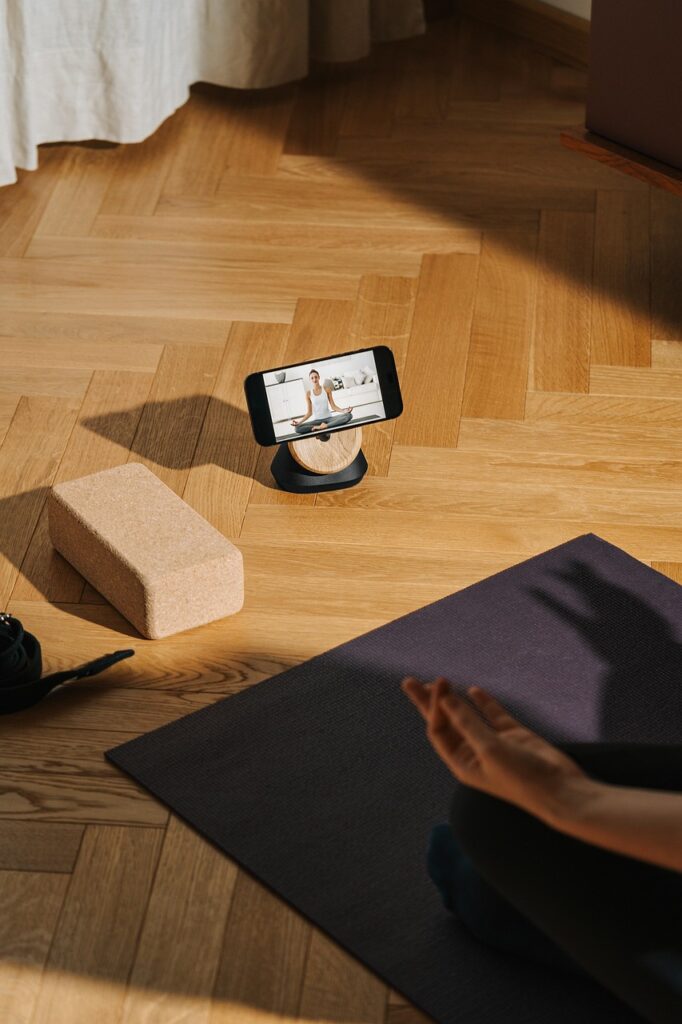


In today’s fast-paced world, stress, anxiety, and mental exhaustion have become a common struggle for many people. With work pressures, daily responsibilities, and endless digital distractions, maintaining mental well-being can be challenging.
Yoga is a powerful tool for improving mental health and reducing stress. Beyond its physical benefits, yoga promotes emotional balance, relaxation, and mindfulness, helping individuals achieve a calmer and more focused mind.
Let’s explore how yoga can enhance mental well-being and provide a sense of peace and stability in daily life.
1. Yoga Lowers Stress and Anxiety Levels
One of yoga’s biggest mental health benefits is its ability to reduce stress and anxiety. Yoga combines deep breathing, physical movement, and meditation, which work together to calm the nervous system and lower stress hormones.
How Yoga Reduces Stress:
 Activates the parasympathetic nervous system (rest-and-digest mode).
Activates the parasympathetic nervous system (rest-and-digest mode). Lowers cortisol (stress hormone) levels.
Lowers cortisol (stress hormone) levels. Reduces muscle tension, helping the body relax.
Reduces muscle tension, helping the body relax.
What the Research Says:
 A study published in the Journal of Psychiatric Research found that regular yoga practice significantly reduces stress and anxiety by lowering cortisol levels.
A study published in the Journal of Psychiatric Research found that regular yoga practice significantly reduces stress and anxiety by lowering cortisol levels. A 2017 study in Frontiers in Psychology concluded that yoga improves stress resilience, making people better at handling daily challenges.
A 2017 study in Frontiers in Psychology concluded that yoga improves stress resilience, making people better at handling daily challenges.
Best Yoga Poses for Stress Relief:
 Child’s Pose (Balasana) – Provides a sense of calm and relaxation.
Child’s Pose (Balasana) – Provides a sense of calm and relaxation. Legs Up the Wall (Viparita Karani) – Reduces nervous system activity.
Legs Up the Wall (Viparita Karani) – Reduces nervous system activity. Savasana (Corpse Pose) – Deeply relaxes the body and mind.
Savasana (Corpse Pose) – Deeply relaxes the body and mind.
 Tip: Practicing yoga for just 15 minutes a day can significantly reduce stress and promote relaxation.
Tip: Practicing yoga for just 15 minutes a day can significantly reduce stress and promote relaxation.
2. Yoga Improves Mood and Fights Depression
Depression can make it difficult to find motivation or energy for daily activities. Yoga naturally boosts mood by increasing serotonin and dopamine levels—the brain’s “feel-good” chemicals.
How Yoga Helps with Depression:
 Encourages mindfulness, which prevents negative thought patterns.
Encourages mindfulness, which prevents negative thought patterns. Increases endorphins, which naturally boost mood.
Increases endorphins, which naturally boost mood. Promotes self-compassion and acceptance, reducing feelings of sadness.
Promotes self-compassion and acceptance, reducing feelings of sadness.
What the Research Says:
 A study published in the Journal of Alternative and Complementary Medicine found that people who practiced yoga for 8 weeks experienced reduced depressive symptoms compared to those who didn’t.
A study published in the Journal of Alternative and Complementary Medicine found that people who practiced yoga for 8 weeks experienced reduced depressive symptoms compared to those who didn’t. Research from Harvard Medical School found that yoga increases gamma-aminobutyric acid (GABA), a neurotransmitter that reduces anxiety and depression.
Research from Harvard Medical School found that yoga increases gamma-aminobutyric acid (GABA), a neurotransmitter that reduces anxiety and depression.
Best Yoga Poses for Mood Enhancement:
 Warrior II (Virabhadrasana II) – Builds confidence and inner strength.
Warrior II (Virabhadrasana II) – Builds confidence and inner strength. Camel Pose (Ustrasana) – Opens the chest, encouraging deep breathing and emotional release.
Camel Pose (Ustrasana) – Opens the chest, encouraging deep breathing and emotional release. Bridge Pose (Setu Bandhasana) – Boosts circulation and energy.
Bridge Pose (Setu Bandhasana) – Boosts circulation and energy.
 Tip: Combining yoga with positive affirmations or gratitude journaling can enhance its mood-boosting effects!
Tip: Combining yoga with positive affirmations or gratitude journaling can enhance its mood-boosting effects!
3. Yoga Enhances Focus and Mental Clarity
Yoga isn’t just about relaxation—it also sharpens concentration and improves cognitive function. The breathing techniques (pranayama) and mindful movements in yoga help clear mental fog and improve focus.
How Yoga Boosts Mental Clarity:
 Enhances oxygen flow to the brain, improving alertness.
Enhances oxygen flow to the brain, improving alertness. Strengthens mind-body awareness, reducing distractions.
Strengthens mind-body awareness, reducing distractions. Encourages present-moment thinking, reducing mental clutter.
Encourages present-moment thinking, reducing mental clutter.
What the Research Says:
 A study in the Journal of Cognitive Enhancement found that yoga practitioners showed better memory, focus, and decision-making skills.
A study in the Journal of Cognitive Enhancement found that yoga practitioners showed better memory, focus, and decision-making skills. A 2019 study in Brain Plasticity revealed that yoga improves gray matter volume in the brain, which supports cognitive function.
A 2019 study in Brain Plasticity revealed that yoga improves gray matter volume in the brain, which supports cognitive function.
Best Yoga Poses for Mental Clarity:
 Tree Pose (Vrikshasana) – Improves balance and concentration.
Tree Pose (Vrikshasana) – Improves balance and concentration. Eagle Pose (Garudasana) – Enhances mental focus and coordination.
Eagle Pose (Garudasana) – Enhances mental focus and coordination. Seated Forward Fold (Paschimottanasana) – Relaxes the mind and body.
Seated Forward Fold (Paschimottanasana) – Relaxes the mind and body.
 Tip: Practicing yoga before work or study sessions can improve focus and productivity.
Tip: Practicing yoga before work or study sessions can improve focus and productivity.
4. Yoga Promotes Better Sleep
Struggling with insomnia or restless nights? Yoga helps improve sleep quality by calming the nervous system and reducing nighttime anxiety.
How Yoga Helps with Sleep:
 Encourages deep relaxation, making it easier to fall asleep.
Encourages deep relaxation, making it easier to fall asleep. Lowers heart rate and blood pressure, signaling the body to rest.
Lowers heart rate and blood pressure, signaling the body to rest. Reduces racing thoughts that keep you awake.
Reduces racing thoughts that keep you awake.
What the Research Says:
 A study published in the Journal of Clinical Psychology found that yoga improves sleep efficiency and quality in people with insomnia.
A study published in the Journal of Clinical Psychology found that yoga improves sleep efficiency and quality in people with insomnia. A 2020 study in Sleep Health found that yoga practitioners have higher melatonin levels, which help regulate sleep.
A 2020 study in Sleep Health found that yoga practitioners have higher melatonin levels, which help regulate sleep.
Best Yoga Poses for Sleep:
 Legs Up the Wall (Viparita Karani) – Lowers stress and tension before bed.
Legs Up the Wall (Viparita Karani) – Lowers stress and tension before bed. Butterfly Pose (Supta Baddha Konasana) – Promotes deep relaxation.
Butterfly Pose (Supta Baddha Konasana) – Promotes deep relaxation. Corpse Pose (Savasana) – Helps release stress and prepare the body for sleep.
Corpse Pose (Savasana) – Helps release stress and prepare the body for sleep.
 Tip: Practicing a short yoga routine before bed can lead to deeper, more restful sleep.
Tip: Practicing a short yoga routine before bed can lead to deeper, more restful sleep.
5. Yoga Encourages Emotional Resilience
Yoga helps individuals develop inner strength and emotional resilience, making it easier to handle life’s challenges with a calm and balanced mindset.
How Yoga Builds Emotional Strength:
 Teaches mindfulness, helping you react calmly in stressful situations.
Teaches mindfulness, helping you react calmly in stressful situations. Encourages self-acceptance, reducing self-judgment and negative emotions.
Encourages self-acceptance, reducing self-judgment and negative emotions. Supports emotional release, allowing you to process feelings in a healthy way.
Supports emotional release, allowing you to process feelings in a healthy way.
What the Research Says:
 A 2018 study in the Journal of Psychiatric Practice found that yoga reduces emotional reactivity, making people less affected by stressful situations.
A 2018 study in the Journal of Psychiatric Practice found that yoga reduces emotional reactivity, making people less affected by stressful situations. A study in the International Journal of Yoga found that yoga practitioners experience greater emotional balance and self-awareness.
A study in the International Journal of Yoga found that yoga practitioners experience greater emotional balance and self-awareness.
Best Yoga Practices for Emotional Well-Being:
 Heart-Opening Poses (Camel Pose, Fish Pose) – Help release emotional tension.
Heart-Opening Poses (Camel Pose, Fish Pose) – Help release emotional tension. Meditation and Deep Breathing (Pranayama) – Encourage relaxation and mindfulness.
Meditation and Deep Breathing (Pranayama) – Encourage relaxation and mindfulness. Yin Yoga or Restorative Yoga – Support emotional healing and balance.
Yin Yoga or Restorative Yoga – Support emotional healing and balance.
 Tip: Pair yoga with daily gratitude or journaling to enhance emotional resilience.
Tip: Pair yoga with daily gratitude or journaling to enhance emotional resilience.
Strengthen Your Mind with Yoga!
Yoga is more than just a physical workout—it is a powerful tool for mental health. By reducing stress, improving mood, enhancing focus, promoting sleep, and building emotional resilience, yoga can help you achieve a happier, healthier, and more balanced life.
Key Takeaways:
 Yoga reduces stress and anxiety by lowering cortisol levels.
Yoga reduces stress and anxiety by lowering cortisol levels. It improves mood and fights depression by increasing serotonin and dopamine.
It improves mood and fights depression by increasing serotonin and dopamine. Yoga enhances focus and mental clarity, improving cognitive function.
Yoga enhances focus and mental clarity, improving cognitive function. It promotes better sleep, helping you feel well-rested and refreshed.
It promotes better sleep, helping you feel well-rested and refreshed. Yoga encourages emotional resilience, making it easier to handle challenges.
Yoga encourages emotional resilience, making it easier to handle challenges.